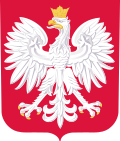18 February 1996 | |
 Ballot used in the referendum | |
| Outcome | Referendums failed as voter turnout was below the 50% quorum required |
|---|---|
| 1. Do you approve the enfranchisement of citizens? | |
| 1. Are you in favour of fulfilling the obligations towards pensioners and disability pensioners, as well as public sector employees, arising from Constitutional Tribunal rulings, using funds from the privatised state assets? | |
| 2. Are you in favour of allocating part of the privatised state assets to public pension funds? | |
| 3. Are you in favour of increasing the value of National Investment Fund share certificates by including more enterprises in this programme? | |
| 4. Are you in favour of including privatisation vouchers in the enfranchisement programme? | |
 |
|---|
A double referendum was held in Poland on 18 February 1996. [1] One question concerned enfranchisement, whilst the others concerned state property. The first proposition was ordered by the President, whilst the others were created on the basis of resolution made by Sejm. All except one were approved by over 90% of voters. However, voter turnout was just 32%, well below the 50% threshold required to make the results valid. [2]
